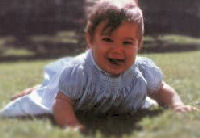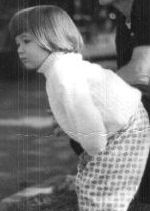Is Your Child Depressed? All About Childhood Depression
Is your child depressed? That’s a frightening thing for a parent to have to think about. I know – I’ve been that parent. But I’ve also been the depressed child, so I have the perspective from both sides, and that’s what I’ll give you in this article.
Introduction
 A few years ago, my mother unearthed some pictures of me as a baby which I had never seen before. One showed me at about eight months old, crawling on the grass of Golden Gate Park. I was looking directly at the camera, my tongue sticking out of the corner of my mouth, and I was laughing. My face was lit from within, and looked happy, confident and even a little mischievous.
A few years ago, my mother unearthed some pictures of me as a baby which I had never seen before. One showed me at about eight months old, crawling on the grass of Golden Gate Park. I was looking directly at the camera, my tongue sticking out of the corner of my mouth, and I was laughing. My face was lit from within, and looked happy, confident and even a little mischievous.
I was absolutely transfixed by that photograph for days. I would continually take it out of my wallet and stare at it, torn between laughter and tears. For a while I couldn’t figure out what it was about the picture that drew me. Finally it hit me; this was the only picture of myself as a child that I had seen which showed me laughing. All the photos I had ever seen depicted a child staring solemnly or smiling diffidently, but never laughing. I looked at the Golden Gate Park picture and wished that I had remained that happy, and that depression had not taken away my childhood.

When I first was diagnosed with depression in 1990, I discussed my childhood with my doctor. Although it is hard to diagnose a child twenty years in the past, it seemed clear to both of us that I had suffered from persistent depressive disorder (mild, long-term depression) probably from the time I was a small child. I read up on children and depression and wished futilely that I had been diagnosed years ago.
While I was studying to be a teacher in the 1990s, I gave a presentation on depression in children to my classmates, many of whom had been teachers for years. I was saddened, although not surprised, by the number of them who told me after class that they had no idea children could suffer from depression. Although many myths and misunderstandings surround adult depression, even more surround depression in children, and these people who dealt with children for hours each day knew no more about the topic than anyone else.
Misconceptions About Children and Depression
One of the most common responses to hearing that a child has depression is, “But what does he/she have to be depressed about?” This statement reveals two major misconceptions. One is the lack of understanding about clinical depression. It is not the same as the “blues” or “down” moods that everyone has from time to time, which may actually be caused by unhappiness with one’s job, home life or other factors. Clinical depression may resemble these emotional dips, but it is much more pervasive, long-lasting, and life-threatening. It is not necessarily caused by an event or state of affairs in a child’s life.
The other misconception is that childhood is a carefree, trouble-free period in our lives. How many people can say that they didn’t worry about peer acceptance, grades, or parental expectations? Adults often forget that children are powerless and have no control over their own lives. This can be a frightening and frustrating state of affairs to live through day after day.
Causes of Childhood Depression

As with adult depression, diagnosis of depression in children is not as clear-cut as it is for other ailments. There is no test that can be given which will positively say that an individual has depression, much less pinpoint the cause(s). The medical community still knows relatively little about the brain, how it works, and what makes it malfunction. In fact, anti-depressant properties of certain medications were discovered by accident in the 1950s while seeking a cure for tuberculosis.
We do know that certain children have risk factors in their lives which could predispose them to depression or could “trigger” depression. Among these are a family history of mental illness or suicide, abuse (physical, emotional or sexual), chronic illness and the loss of a parent at an early age to death, divorce or abandonment. However, some infants exhibit depressive symptoms at an early age before most of these factors come into play, so there is an argument to be made for depression being wholly chemical in some children. Each child’s depression is individual, and causes will be different for each one. The depression could be wholly chemical, wholly due to psychological factors, or a combination of the two. More important than the cause is identifying the illness and treating it.
Symptoms of Depression in Children
- Persistent sadness and/or irritability.
- Low self-esteem or feelings of worthlessness. A child may make such statements as “I’m bad. I’m stupid. No one likes me.”
- Loss of interest in previously enjoyed activities.
- Change in appetite (either increase or decrease).
- Change in sleep patterns (either increase or decrease).
- Difficulty concentrating.
- Anger and rage
- Headaches, stomachaches or other physical pains that seem to have no cause.
- Changes in activity level. The child either becomes more lethargic or more hyperactive.
- Recurring thoughts of death or suicide.

Any change in a child’s behavior that seems to have no external or physical cause should be looked at. A low mood which results from a loss (death of a loved one, moving, changing schools) which lasts more than a few weeks should be considered possible depression and checked out.
If the child has bipolar disorder, also known as manic depression, these symptoms could be present:
- abrupt, rapid mood swings
- periods of extreme hyperactivity
- prolonged, explosive temper tantrums or rages
- exaggerated ideas about self or abilities
Bipolar disorder is often misdiagnosed as attention-deficit disorder with hyperactivity (ADHD), obsessive-compulsive disorder (OCD), oppositional defiant disorder or conduct disorder.
Related Disorders
Depression often goes hand-in-hand with other mental illnesses or disorders such as Attention Deficit Disorder, and, especially in teenage girls, eating disorders and self-injury. If any of these conditions are present, they need to be treated along with the depression for treatment to be effective.
Depression Treatment
The parents of any child who is in immediate danger of harming himself or others should consider hospitalization. This is a tough choice for parents to make, but it must be emphasized that children do commit suicide.

Once a child has been diagnosed with depression, both psychotherapy and medication could be options. More and more, doctors are realizing that chemical imbalances often account for mental illness, but at the same time, the importance of psychotherapy cannot be discounted. If a child’s depression has been caused wholly or in part by psychological factors, medication may relieve the depression, but the underlying cause will not be “cured” by medication alone. Therapy can help the child deal with his past in a healthy manner, and also in learning ways to cope with the very difficult process of growing up.
Antidepressant medication for children is a controversial topic. There are no long-term studies that show what kind of impact this medication will have on a child’s development. The maker of the antidepressant Effexor, in fact, has warned against it being prescribed for children, and the U.S. Food and Drug Administration has issued the same warning for Paxil. There has also been some question as to whether the older tricyclic antidepressants are effective with children. Most professionals will recommend therapy as a first line of defense for a child with depression, except in cases where the child is severely depressed or suicidal.
But keep in mind that it is almost a certainty that depression will have negative long-term effects on the child and his family. From my own experience, I am positive that my growing up with depression had negative effects on the development of my personality. For instance, even with my successful treatment with antidepressants, it’s very hard for me to completely shake the crippling shyness I grew up with. The decision of whether to treat a child with medication is wholly individual, depending on the severity of the child’s depression and what toll it will take on the child’s life without successful treatment. Parents should educate themselves as much as possible in order to make an informed decision.
Note: Bipolar disorder must be ruled out before a child is prescribed antidepressants for depression or stimulants, as these can trigger mania.
Parents of a child with depression should start looking for a child psychiatrist by contacting the nearest university medical center, mental health clinic or organization.
Links
[links category_name=”Depression in Children”]
2 Comments
paloma
I don’t know but i have a viewpoint about this topic. Children’s temper depend how their mother feels during the pregnacy. I have listened from doctor and psychologist that babies feel their mother’s feelings. So that if mothers are unhappy, stressed, depressed then their babies will became unhappy, depressed and stressed people in the future. I belive it because it happened to me and now i am facing with this problem. Belive me it is not easy facing on , it is a very sad situation because this problem doesn’t treat with pills much times. Its solutions depend of the same persons and for them it is not easy to echieve it, in fact, these people suffer a lot and spend long time trying to master their soul pain, they spend lots time at the psycholoist office and never feel really better.In the other hand their relatives surronding them suffer, too.
Pingback: